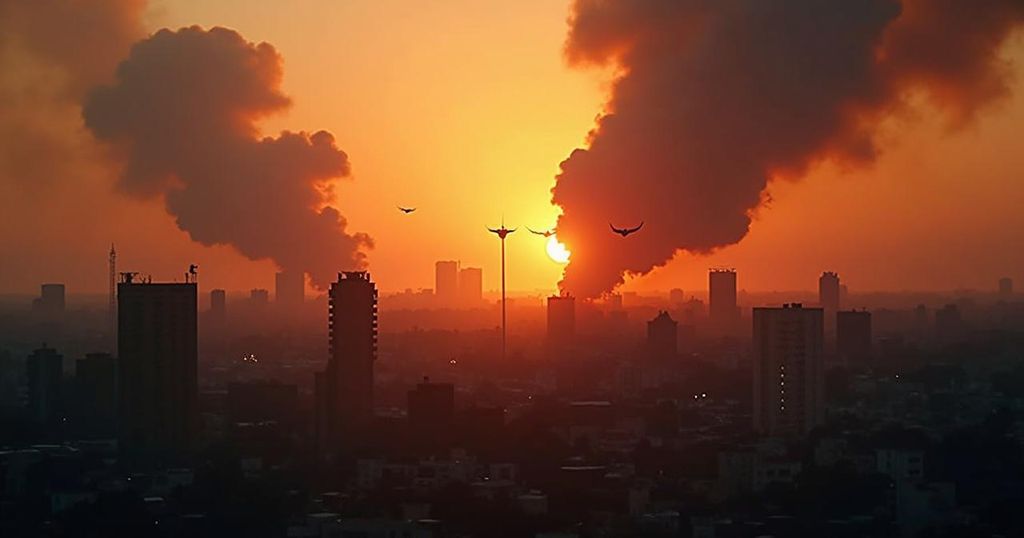Escalating Violence: Israeli Air Strikes Claim Lives in Central Beirut
Israeli air strikes in central Beirut have killed at least six people, with a total of 46 fatalities reported across Lebanon in 24 hours. The UN Security Council convened for an emergency meeting, stressing the need for de-escalation, while Secretary-General António Guterres faced diplomatic tensions from Israel. The situation remains volatile, with ongoing explosions and significant casualties in the area.
Overnight Israeli air strikes in central Beirut have resulted in the deaths of at least six individuals, as reported by the Lebanese Health Ministry. This attack comes amidst a backdrop of escalating violence, with 46 reported fatalities across Lebanon within a mere 24-hour period. In response to the ongoing crisis, an emergency session of the United Nations Security Council convened, where Secretary-General António Guterres emphasized the urgent need for de-escalation in the region. During the nearly three-hour meeting, representatives from Iran and Israel defended their respective military actions, while Lebanon called for the enforcement of the 2006 UN Security Council resolution that mandates the establishment of a demilitarized buffer zone in southern Lebanon. In a further escalation of diplomatic tensions, Israel’s foreign minister declared Secretary-General Guterres persona non grata, effectively barring him from entering Israel, accusing him of siding with Hezbollah, Hamas, and Iran. Although the Secretary-General refrained from publicly addressing the ban, his spokesperson commented on the situation. As the Security Council meeting concluded, the council members found themselves in a state of anticipation regarding Israel’s next moves amid the rapidly deteriorating situation on the ground. The air strikes targeted a specific floor in a building in the Bashoura area of Beirut, which had drawn considerable public attention due to the ongoing hostilities. An Al Jazeera correspondent reported, “We know so far there have been six fatalities,” with two individuals succumbing to injuries immediately and additional fatalities occurring later as a result of treatments in medical facilities. As the correspondent continued their reporting, the situation remained dire, with reports indicating that approximately seven other individuals are currently hospitalized for their injuries. The UN Secretary-General has previously warned that the fires of conflict in the Middle East are “fast becoming an inferno,” reiterating the urgency with which the cycle of violence must be halted. Meanwhile, as the alert escalates, correspondents in Beirut report near-constant explosions, emphasizing the gravity of the circumstances in the city.
The news surrounding Israeli air strikes in Beirut reflects an ongoing and complex regional conflict that has seen heightened tensions between Israel, Hezbollah, and Iran. These military actions, particularly in urban centers like Beirut, are indicative of the violent political landscape in Lebanon and the broader Middle East. Historical grievances, scheduling UN Security Council resolutions, and evolving military strategies contribute to the fluid and explosive situation on the ground. The impact of these strikes is profound, evidenced by the ongoing casualties and the humanitarian crisis exacerbated by military action. This deep-seated conflict raises concerns regarding international stability and human rights in the region, prompting urgent calls for a cessation of hostilities.
In summary, the recent Israeli air strikes in central Beirut, resulting in multiple fatalities, underscore the escalating violence within the region and the urgent need for diplomatic interventions. The UN Security Council’s discussions reflect a broader international concern over the spiraling conflict and the implications for regional security. As both Iran and Israel stand firm in their positions, the humanitarian cost continues to rise, necessitating immediate attention and action to de-escalate the situation and address the underlying tensions fueling the conflict.
Original Source: www.aljazeera.com




Post Comment